#terracotta jewellery
Explore tagged Tumblr posts
Text
Ganesh Chaturthi Celebrations: Adorn Yourself with Traditional Jewellery
Ganesh Chaturthi Celebrations: Elevate Your Style with Exquisite Traditional Jewellery

Introduction:
Ganesh Chaturthi, one of the most revered Hindu festivals, celebrates the birth of Lord Ganesha, the elephant-headed god of wisdom and prosperity. It is a time when devotees across India come together to worship and seek the blessings of Lord Ganesha. Apart from the traditional rituals and grand processions, another aspect that adds charm to this festival is the exquisite traditional jewellery that people adorn themselves with. Ganesh Chaturthi traditional jewellery not only enhances one's appearance but also holds cultural and religious significance. In this article, we will delve into the world of Ganesh Chaturthi Traditional jewellery, exploring its types, significance, and the joy it brings to the festivities.
I. Types of Ganesh Chaturthi Traditional Jewellery:
Temple Jewellery:
Temple jewellery is characterized by intricate designs inspired by temple architecture. It typically features motifs of deities, including Lord Ganesha, making it a perfect choice for Ganesh Chaturthi. These pieces are usually made of gold and adorned with precious stones.
Vintage Jewellery:

Vintage jewellery pieces, often passed down through generations, have a timeless charm. They may include necklaces, earrings, and bangles with unique designs that evoke a sense of nostalgia.
Terracotta Jewellery:
Terracotta jewellery is crafted from clay and hand-painted with vibrant colours. It offers a rustic and earthy look, perfect for those looking for a more traditional and eco-friendly option.
Kundan Jewellery:
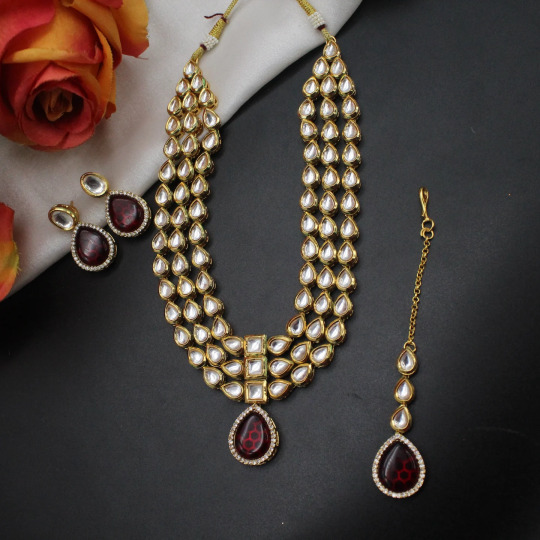
Kundan jewellery is known for its elegant and elaborate craftsmanship. It involves setting gemstones, usually uncut diamonds, in a gold or silver base. The intricate detailing and vibrant colours make it a popular choice for festive occasions.
Filigree Jewellery:
Filigree jewellery is characterized by delicate and intricate metalwork, often in the form of earrings, pendants, or rings. It adds a touch of sophistication to any outfit and is a great choice for Ganesh Chaturthi celebrations.
II. Significance of Ganesh Chaturthi Traditional Jewellery:
Ganesh Chaturthi jewellery holds a profound significance beyond its aesthetic appeal. It is a symbol of devotion and reverence towards Lord Ganesha. Here are some aspects of its importance:
Religious Symbolism: Many pieces of Ganesh Chaturthi jewellery feature Lord Ganesha's likeness, serving as a constant reminder of the divine presence and blessings during the festivities.
Cultural Heritage: Traditional jewellery embodies the rich cultural heritage of India. Wearing it during Ganesh Chaturthi celebrations helps preserve and pass down this heritage to future generations.
Emotional Connection: In many families, these jewellery pieces are heirlooms with sentimental value. Wearing them during the festival connects individuals to their roots and ancestors.
Auspiciousness: Gold and other precious metals are considered auspicious in Hindu culture. Wearing such jewellery is believed to bring good luck and prosperity during the festival.
Enhancing the Festive Spirit: Adorning oneself with intricate jewellery enhances the festive spirit and adds to the overall grandeur of the Ganesh Chaturthi celebrations.
III. Choosing the Right Ganesh Chaturthi Traditional Jewellery:
Selecting the perfect Ganesh Chaturthi jewellery can be a delightful experience. Here are some tips to help you make the right choice:
Consider the Outfit: Your choice of jewellery should complement your outfit. Traditional silk sarees or lehengas are commonly worn during Ganesh Chaturthi, and the jewellery should match the attire's colour and style.
Budget: Determine your budget before shopping for jewellery. Ganesh Chaturthi jewellery comes in a wide price range, from affordable options to high-end pieces. Set a budget and stick to it.
Personal Style: Choose jewellery that reflects your personal style. Whether you prefer intricate designs or simple elegance, there's a Ganesh Chaturthi jewellery piece for everyone.
Metal Preference: Decide if you want gold, silver, or other metals. Gold is a traditional favourite for its auspiciousness, while silver offers a more contemporary choice.
Gemstones: If you opt for gemstone-studded jewellery, consider the significance of the gemstones. For example, emeralds are associated with Lord Ganesha and can be a meaningful choice.
Conclusion:
Ganesh Chaturthi is a time of joy, devotion, and celebration, and adorning oneself with traditional jewellery adds a touch of elegance and cultural significance to the festivities. From temple jewellery to antique pieces, the choices are vast and diverse, catering to individual preferences and styles. Beyond their aesthetic appeal, these jewellery items serve as a symbol of devotion to Lord Ganesha and help preserve India's rich cultural heritage. So, as you prepare to celebrate Ganesh Chaturthi, consider the significance of the jewellery you wear, and let it enhance your connection to this auspicious occasion.
#online jewelry#traditional jewelry#Ganesh chaturthi jewellery#kundan jewellery#Filigree Jewellery#Terracotta Jewellery#Vintage Jewellery#Temple Jewellery
0 notes
Text
Embracing eco friendly elegance which is a teracotta ornaments
As the world recognizes the rising urgent need for sustainable practices and eco-friendly alternatives, many people are turning to environmentally safe choices in their lives. Terracotta ornaments stand out as a gorgeous and eco-friendly key in the fashion design industry. These timeless pieces, made of natural clay, have numerous benefits that go beyond looks. In this blog, we'll look at why terracotta ornaments are a great option for people who want to incorporate sustainability into their life while still adding a touch of elegance to their homes. Terracotta, which means "baked earth" in Italian, is made completely from natural clay, which is abundantly available throughout. Unlike many other materials that need substantial mining and extraction processes, the fundamental element in terracotta, clay, can be got from the soil in a sustainable manner.
#homemade ornaments#homemade jewellery#handmade jewellery#terracotta jewellery#handmade necklace#handmade jewellery design#terracotta earrings#handcrafted jewelry#terracotta jewellery online#handmade earrings design#terracotta necklace#handmade necklace design#home made jewellery#handmade beaded jewelry
0 notes
Text


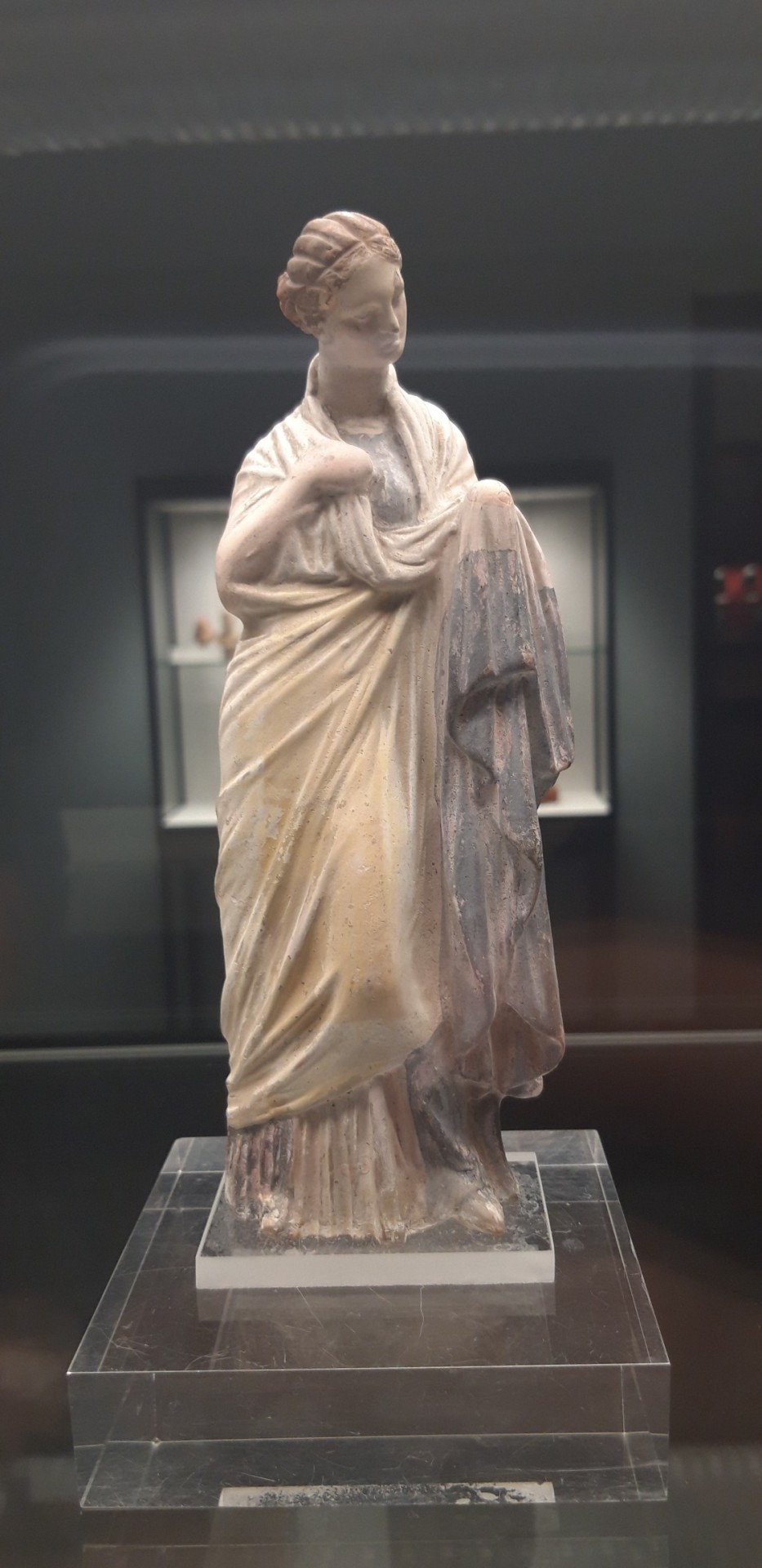
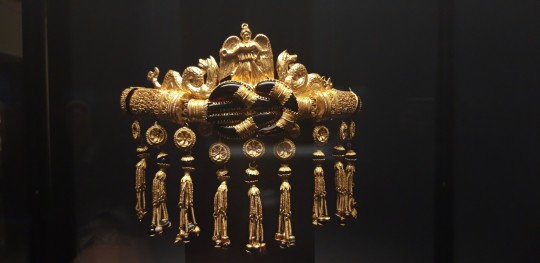





#once again photo review of last month!!#found a picture frame and decided that my cat would look absolutely gorgeous in it. and i was right!#then a obligatory sunset pic on the way home from work i can't believe that it's finally getting brighter#went to munich to meet with friends and go to the ancient collection museum (roman/etruskan vases art sculptures and jewellery)#and ofc the gold necklaces and diadem!! i made 200 pics and ¾ are of jewellery lol#Beautiful!! the sculptures of the little dogs and the very well preserved terracotta figurine#and the last pic shows the “it's wednesday my dudes” in the german version “es ist mittwoch meine kerle”#that was drawn by my dear friend 2 years ago and that i now found cleaning my room haha#anyway this last month was fun can't wait for what will happen in march!#meins
0 notes
Text
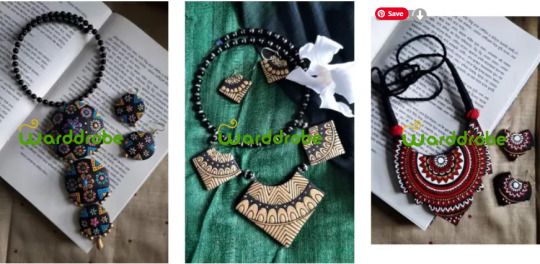
In the world full of artificial products, Terracotta jewelry has become a famous trendy yet eco-friendly fashion item in modern world. Let's explore the fascinating artistry behind every terracotta jewelry piece in this blog, https://bresdel.com/blogs/408919/Revealing-the-Craftsmanship-of-Terracotta-Jewelry-with-Warddrobe.
#business#jewelry#handmade jewelry#handmade jewellery manufacturers in kolkata#handmade#jewellery manufacturers suppliers in kolkata#wardrobe#designer jewellery online india#designer jute and canvas bag#manufacturer and wholesaler#Terracotta Jewellery collections#Terracotta Jewelry
0 notes
Text
i literally spend at least 2 hours a week just looking at various pictures of the terracotta army. utterly entranced. look at the details in the hair. you'd never see ANY of this when they're lined up in formation, but they're there.
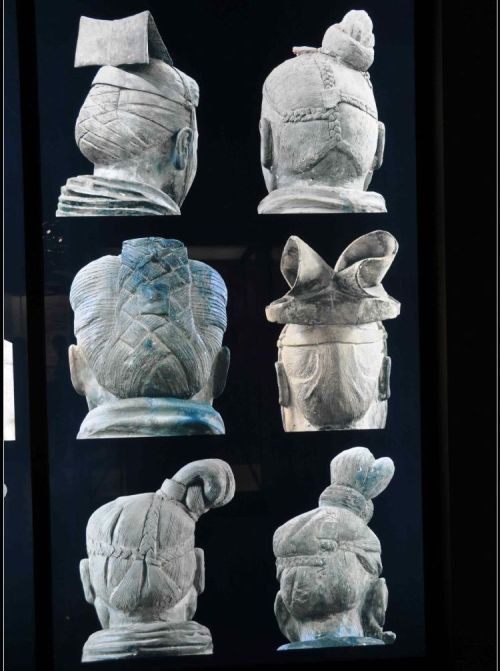
theres about 8000 of these guys down there, no two faces are alike. they're works of art. they're the manifestation of a cruel despot's delusions of grandeur. a talisman against the terrible inevitability of death, both pathetic and strangely pitiful. like watching a child clinging to his blanket, begging you not to turn off the light. they were a bunch of insignificant clay statues from a side chamber that was so small and unremarkable, no one bothered to write down the location. they were modelled after real people. their only purpose was to serve qin shi huang in the afterlife, so he could reign in heaven as he did on earth. now the emperor is just a ghost and his pawns are immortal. my dad and i visited them in the dead of winter, on a weekday, just so we wouldn't have to deal with tourists like us. the place had easily 500 people--not including the ones below ground. we traveled to xian via the old "green skin" diesel train. there are faster means, like highspeed rail but dad insisted i try the authentic way, the same way he would have traveled when he was my age it was also like, a quarter of the price but im sure that had nothing to do with it! back in the 80s carriages would get so packed people had to have their luggage passed in via the windows. as we chugged along, i read my book and my dad made us cup noodles. car is just a shortened version of "carriage", the word is the same but the mechanism is different. it's the same in chinese. i think if i told someone from the warring states period i could travel from the Kingdom of Qi to Qin in just four hours with my metal carriage, i'd be laughed out of town--or accused of being a spy and sentenced to 'death by carriage.' we hopped off the train at 4am and took a different "carriage." the taxi driver joked; "basically every dynasty put their capital in xian, stick a shovel anywhere and you'll turn up some national treasure or another." i wonder what it would have felt like to be a farmer digging a well and then out pops a remarkably realistic human head. statistical analysis show the soldier's faces bear a strong similarity to people living in the region today. the taxi stopped in front of a jewellery-hawking tourist trap and refused budge an inch until we went inside. did you know the terracotta soldiers were originally multi-coloured and painfully gaudy, just like the greek marbles? they were made assembly-line style. the arms and legs were made from the same workshops that made clay plumbing pipes and roof tiles. for quality control, the artisans were required to stamp their names. the workers who built these tombs were executed shortly afterwards, because only dead men can be trusted with secrets. qin shi huang's mausoleum is unlikely to be excavated in my father's lifetime, or mine, not unless i'm willing to take a BIG ONE for the team... instead of the tomb, they built some kind of qin shi huang-themed theme park next to it. not only was it tacky as hell the entrance fee was like $50. we went to the museum and i looked at bronze tools and pottery shards for three hours. look why can't we just crack the thing open i can't be the only one here whos dying from curiosity what if we all just took turns digging
#qin shi huangs terracotta army#warring states#qin dynasty#thinking about Her...<3 bronze tools and pottery shards <3#my writing
1K notes
·
View notes
Photo

Mycenaean Art
The Mycenaean civilization flourished in the late Bronze Age from the 15th to the 13th century BCE, and their artists would continue the traditions passed on to them from Minoan Crete. Pottery, frescoes, and goldwork skillfully depicted scenes from nature, religion, hunting, and war. Developing new forms and styles, Mycenaean Art would prove to be more ambitious in scale and range of materials than Cretan art and, with its progression towards more and more abstract imagery, go on to influence later Greek art in the Archaic and Classical periods.
Inspirations
The Mycenaean civilization was based on mainland Greece but ideas and materials came via trading contacts with other cultures across the Mediterranean. Imported materials included gold, ivory (principally from the Syrian elephant), copper, and glass, while in the other direction went Mycenaean goods such as pottery to places as far afield as Egypt, Mesopotamia, the Levant, Anatolia, Sicily, and Cyprus.
In art as expressed in fresco, pottery, and jewellery, the earlier Minoan culture on Crete greatly influenced Mycenaean art. The Minoan love of natural forms and flowing design especially was adopted by Mycenaean artisans but with a tendency to more schematic and less life-like representation. This new style would become the dominant one throughout the Mediterranean. Geometric designs were popular, too, as were decorative motifs such as spirals and rosettes. Pottery shapes are much like the Minoan with the notable additions of the goblet and the alabastron (squat jar) with a definite preference for large jars. Terracotta figurines of animals and especially standing female figures were popular, as were small sculptures in ivory, carved stone vessels, and intricate gold jewellery. Frescoes depicted plants, griffins, lions, bull-leaping, battle scenes, warriors, chariots, figure-of-eight shields, and boar hunts, a particularly popular Mycenaean activity.
Continue reading...
99 notes
·
View notes
Text
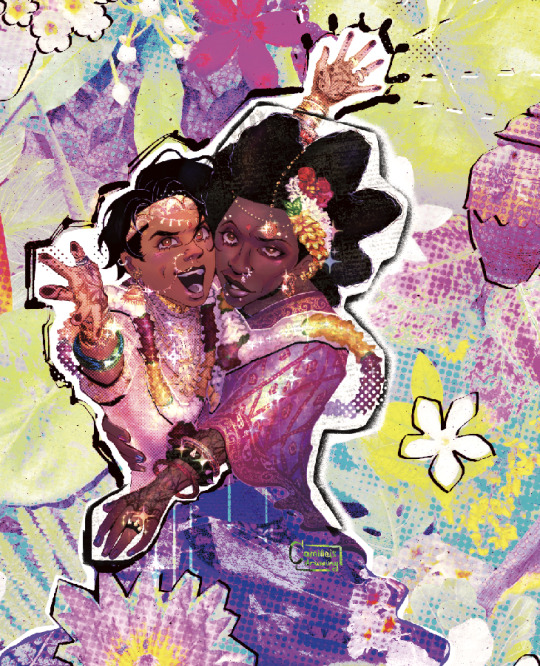
they might be married a bit
[ID: Pavitr is wearing an eggshell-colour kurta pajama, a nath/nose hoop, many necklaces, and other shiny jewellery including the ring on his left ring finger, his hands up like a dance pose, his smile wide and proud. Their faces beside each other, Hobie hugs his waist, showing the audience a spiky ring on his left ring finger. Hobie is wearing an embellished deep red sari, bindi, nose ring and multiple bracelets. He has fresh flowers in his hair. Both of them wear henna on their hands and arms. Hobie's resembles spider webs or his torn fishnets, Pavitr's lotuses in full bloom. They also wear floral garlands on their neck. They look like a paper cut-out on a lime-green, cyan, magenta and violet halftone collage background, which consists of various leaves and flowers and a terracotta vase. Fern, lotus and gardenia just to name a few. Photos are taken from our garden.]
#camilleisdrawing#digital art#digital illustration#digital painting#collage#spiderverse#across the spider verse fanart#across the spiderverse#atsv#hobie brown#pavitr prabhakar#spiderverse fanart#pavpunk#goldenpunk#hobie x pavitr#traditional clothing#digital collage
392 notes
·
View notes
Text

What Is The Main Ingredient of WD-40?
Before you read to the end, does anybody know what the main ingredient of WD-40?
No Cheating.....
WD-40 ~ Who knew!
I had a neighbour who bought a new pickup.
I got up very early one Sunday morning and saw that someone had spray
painted red all around the sides of this beige truck (for some unknown
reason).
I went over, woke him up, and told him the bad news.
He was very upset and was trying to figure out what to do ....
probably nothing until Monday morning, since nothing was open.
Another neighbour came out and told him to get his WD-40 and clean it off.
It removed the unwanted paint beautifully and did not harm his paint
job that was on the truck. I was impressed!
WD-40 who knew?
"Water Displacement #40".
The product began from a search for a rust preventative solvent and
degreaser to protect missile parts.
WD-40 was created in 1953, by three technicians at the San Diego
Rocket Chemical Company.
Its name comes from the project that was to find a 'Water
Displacement' Compound.
They were finally successful for a formulation, with their fortieth
attempt, thus WD-40. The 'Convair Company' bought it in bulk to
protect their atlas missile parts.
Ken East (one of the original founders) says there is nothing in WD-40
that would hurt you.
When you read the 'shower door' part, try it. It's the first thing
that has ever cleaned that spotty shower door. If yours is plastic,
it works just as well as on glass. It's a miracle!
Then try it on your stove-top.
It's now shinier than it's ever been.
You'll be amazed.
WD-40 Uses:
1. Protects silver from tarnishing.
2. Removes road tar and grime from cars.
3. Cleans and lubricates guitar strings.
4. Gives floor that 'just-waxed' sheen without making them slippery.
5. Keeps the flies off of Cows, Horses, and other Farm Critters.
6. Restores and cleans chalkboards.
7. Removes lipstick stains.
8. Loosens stubborn zippers.
9. Untangles jewellery chains.
10. Removes stains from stainless steel sinks.
11. Removes dirt and grime from the barbecue grill.
12. Keeps ceramic/terracotta garden pots from oxidising.
13. Removes tomato stains from clothing.
14. Keeps glass shower doors free of water spots.
15. Camouflages scratches in ceramic and marble floors.
16. Keeps scissors working smoothly.
17. Lubricates noisy door hinges on both home and vehicles doors.
18. It removes that nasty tar and scuff marks from the kitchen
flooring. It doesn't seem to harm the finish and you won't have to
scrub nearly as hard to get them off. Just remember to open some
windows if you have a lot of marks.
19. Remove those nasty bug guts that will eat away the finish
on your car if not removed quickly!
20. Gives a children's playground gym slide a shine for a super fast slide.
21. Lubricates gearshift and mower deck lever for ease of handling on
riding mowers.
22. Rids kids rocking chair and swings of squeaky noises.
23. Lubricates tracks in sticking home windows and makes them easier to open.
24. Spraying an umbrella stem makes it easier to open and close.
25. Restores and cleans padded leather dashboards in vehicles, as well
as vinyl bumpers.
26. Restores and cleans roof racks on vehicles.
27. Lubricates and stops squeaks in electric fans.
28. Lubricates wheel sprockets on tricycles, wagons and bicycles for
easy handling.
29. Lubricates fan belts on washers and dryers and keeps them running smoothly.
30. Keeps rust from forming on saws and saw blades, and other tools.
31. Removes grease splatters from stove-tops.
32. Keeps bathroom mirror from fogging.
33. Lubricates prosthetic limbs.
34. Keeps pigeons off the balcony (they hate the smell).
35. Removes all traces of duct tape.
36. Folks even spray it on their arms, hands, and knees to relieve
arthritis pain.
37. Florida 's favourite use is: 'cleans and removes love bugs from
grills and bumpers.'
38. The favourite use in the state of New York , it protects the Statue
of Liberty from the elements.
39. WD-40 attracts fish. Spray a little on live bait or lures and you
will be catching the big one in no time. Also, it's a lot cheaper than
the chemical attractants that are made for just that purpose. Keep
in mind though, using some chemical laced baits or lures for fishing
are not allowed in some states.
40. Use it for fire ant bites. It takes the sting away immediately and
stops the itch.
41. It is great for removing crayon from walls. Spray it on the marks
and wipe with a clean rag.
42. Also, if you've discovered that your teenage daughter has washed
and dried a tube of lipstick with a load of laundry, saturate the
lipstick spots with WD-40 and rewash. Presto! The lipstick is gone!
43. If you spray it inside a wet distributor cap, it will displace the
moisture, allowing the engine to start.
My discovery, Ants don't like it..................
P.S.
As for that Basic, Main Ingredient.......
Well.... it's FISH OIL....
Now This Is Definitely Worth SHARING!!
60 notes
·
View notes
Text
Figurine from Georgia (South Caucasus), c.300-200 BCE: this figurine was found buried in a pit beneath the ruins of an ancient temple; it was decorated with gold jewelry, wrapped in a burial shroud, and then placed in its own special "grave"
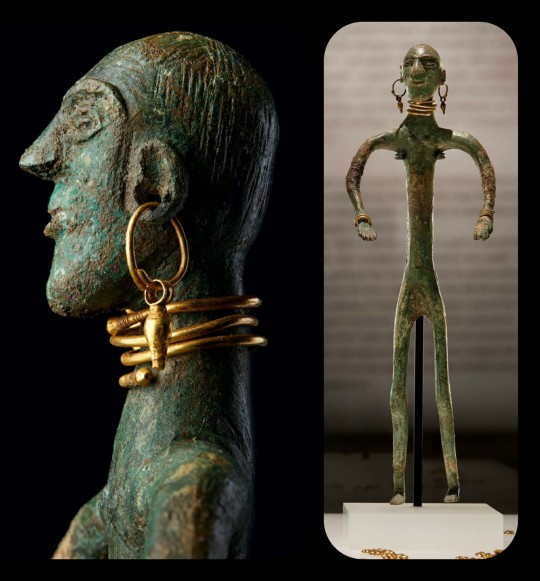
This is one of seven figurines that have been unearthed from similar burial pits throughout the city of Vani, which once served as the cultural, religious, and administrative center for the Kingdom of Colchis. Each figurine was crafted from bronze or iron, decorated with pieces of gold jewelry, wrapped in a special shroud, and then buried in a small "grave" that had been dug beneath (or near) one of the many temples that once stood throughout the city.
From The Golden Graves of Ancient Vani:
... other discoveries at Vani have shed light on Colchian culture. Most compelling are seven metal figurines, dating to 300–200 B.C., that have been discovered both in and near sacred structures at Vani. Adorned with gold jewelry and apparently wrapped in decorated garments, the figures were carefully buried in a way that seems to mimic the human burials at the site. Their precise function remains unclear, but they probably related to local religious and funerary customs.
And the Fitzwilliam Museum (which exhibited some of the artifacts from Vani back in 2008) adds:
Distinct local ritual practices are suggested during [the 3rd century BCE] as can bee seen from the four bronze and iron figurines displayed in the exhibition. These were discovered on the city’s upper terrace and were all buried in or near a sanctuary; this placement may well indicate a religious or funerary function for the figurines. The example illustrated here was placed between two terracotta tiles that were buried in a pit cut into the bedrock, thus mimicking contemporary human burials.
The figurine has a head with disproportionately large features, a low sloping brow, and an elongated torso with bowed arms and stiffly rendered legs. Most striking is its lavish gold jewellery, some of which reflects types worn by those buried at Vani. In addition to gold earrings, a torque (neck ring), and bracelets, five gold rosettes appear to have been strung around the figurine’s head and several pendants were found in its chest area.
The form and detail of their jewellery date the four figurines to the 3rd century BC. Their precise function, surely of local religious nature, still remains a subject of discussion. However, it is worth noting that the intriguing practice of burying such figurines in a ritualistic manner appears to be specific to Vani during its phase as a sanctuary city.
During antiquity, the Kingdom of Colchis covered the Western half of what is now the nation of Georgia, located in the South Caucasus. Colchis was famous for its talented goldsmiths, and it ultimately came to be known as the homeland of the fabled Golden Fleece -- the destination of Jason and the Argonauts, according to the Greek Argonautica.
Sources & More Info:
J. Paul Getty Museum: The Golden Graves of Ancient Vani
Fitzwilliam Museum: Ritual
Fitzwilliam Museum: From the Land of the Golden Fleece
Institute for the Study of the Ancient World: Wine, Worship, and Sacrifice
Journal of Greek, Roman, and Byzantine Studies: Vani: An Ancient City of Colchis (PDF download)
#archaeology#history#artifact#ancient history#art#vani#colchis#kolkheti#sakartvelo#georgia#caucasus#ritual artifact#religion#mythology#anthropology#ancient greece#crafting#sculpture#paganism#ancient ruins#ancient temple
53 notes
·
View notes
Note
can u elaborate on bengali culture being appropriated from santhal culture. i assume you're talking about those aspects which are today associated with UC bengalis or am i off track
Not exclusively santhal but a lot of the hallmarks of Bengali culture have roots in adivasi communities. The iconic shankha-pola is from a practice among fishing tribes in Sunderban. A lot of bengali wedding practices like the gnatchhora, blessing the bride and groom with grass on the forehead, the gaachkouto, kolka on the bride's forehead, the palki, carrying the bride for shubhodrishti, all have origins in santhal wedding practices. Alpona is also derived from santhal house paintings.
The clay and terracotta jewellery of Shantiniketan, popular with uc intellectuals of college street and jadavpur, all originate from the santhals of birbhum. Also bindis on the chin and neck, septum rings, upper arm bracelets, ear coverings. A lot of the santhal artists creating artwork and jewellery are exploited as they are either hired as underpaid labourers or their work is bought in bulk wholesale by boutiques and jewellery pages in Kolkata, and sold at high prices while the actual creators never see the profits.
Not to mention the goddess Kali is derived from older adivasi goddesses, as are elements of Shakti and Tantrik traditions.
#im not going too deep into the religious aspect of it because that is whole other can of worms#appropriation only happens when elements of culture are stolen and used without giving any credit like in the examples i mentioned#unlike say dokra art or mask making from purulia where adivasis were able to retain the ownership and rights over the art forms#the unesco recognition for dokta art definitely helped with that#tina rambles
5 notes
·
View notes
Text
Thinker of Cernavoda (c.5,000 BCE)


Characteristics and History
The Thinker of Cernavoda depicts a human figure (traditionally interpreted as male) sitting on a stool, with his head in his hands and his elbows on his knees. Although seen as male, the figure's gender is not completely unambiguous - an attribute common to many ancient figurines from southeast Europe. His small angular head sits on top of a thick extended neck, while the eyes, which are too large for the face, are rendered as concave rather than the more usual convex-shape typical of Romanian carvings. His broad-hipped trunk has thick thighs and calves.
Coloured a dark brownish-red, the sculpture is 4.5 inches tall and is made out of terracotta, an unglazed, clay-based ceramic. It was created during the Hamangia culture (named after the site of Baia-Hamangia), a Late Neolithic archeological culture (5250-4500 BCE) which took root in Dobruja (Romania and Bulgaria) between the River Danube and the Black Sea. It is worth noting that the body as a whole is entirely devoid of the ornamentation or engraved decoration which is frequently seen in plastic art and pottery of both the Hamangia culture and the subsequent Cucuteni culture (4500-3000 BCE). It is also quite different from the bolder zoomorphic and anthropomorphic figurines, animal-head jewellery, and other cult objects of the nearby Vinca culture (5500–4500 BCE; named after the type site, Vinca-Belo Brdo), which was centred on Serbia, but extended into Romania and Bulgaria. (See also: Primitive Art.)
The Sitting Woman of Cernavoda, too, is quite plain and undecorated, unlike the usually extremely stylized, faceless female figurines complete with exaggerated breasts and buttocks.
Unfortunately, nothing is known about the sculptor who created the Thinker of Cernavoda, his workshop or school, or whether his style was copied by his contemporaries.
-http://www.visual-arts-cork.com/sculpture/thinker-of-cernavoda.htm
4 notes
·
View notes
Text


Terracotta Votive Figurine from Egypt dated between 600 - 475 BCE on display at the Burrell Collection in Glasgow, Scotland
This figurine has an elaborate hairstyle and jewellery, including drop-shaped earrings. It may have been place in a shrine or a temple as a gift to the gods or to venerate a real person.
Photographs taken by myself 2023
#art#archaeology#fashion#ancient#history#iron age#egypt#egyptian#burrell collection#museum#glasgow#barbucomedie
19 notes
·
View notes
Text
TERRACOTTA ORNAMENTS EMBRACING ECO-FRIENDLY ELEGANCE
As the world recognizes the rising urgent need for sustainable practices and eco-friendly alternatives, many people are turning to environmentally safe choices in their lives. Terracotta ornaments stand out as a gorgeous and eco-friendly key in the fashion design industry. These timeless pieces, made of natural clay, have numerous benefits that go beyond looks. In this blog, we'll look at why terracotta ornaments are a great option for people who want to incorporate sustainability into their life while still adding a touch of elegance to their homes. Terracotta, which means "baked earth" in Italian, is made completely from natural clay, which is abundantly available throughout. Unlike many other materials that need substantial mining and extraction processes, the fundamental element in terracotta, clay, can be got from the soil in a sustainable manner.
#homemade ornaments#homemade jewellery#handmade jewellery#terracotta jewellery#handmade necklace#handmade jewellery design#terracotta earrings#handcrafted jewelry#terracotta jewellery online#handmade earrings design#terracotta necklace#handmade necklace design#home made jewellery#handmade beaded jewelry
0 notes
Text
Figures.
I don’t have to be Etruscan or know anything about what it’s like to be Etruscan or even have any Etruscan friends to know that there were Etruscans, and that they were around before the Roman Empire, and had a huge influence on Rome, who in turn had a huge influence on us.
Anyway, here’s a pair of Etruscan statues. The text on the sign reads:
“Terracotta Seated Figures. Etruscan, about 625-600 BC.
From the tomb of the Five Chairs, Carveteri.
These figures were found during 1865 in a side-chamber of the tomb at Cerveteri They were enthroned on two of the five rock-cut chairs, from which the tomb takes its name (see illustration on panel).
The figures are restored; the heads are female but the bodies may be male. The concept of large-scale sculpture and the style of the faces show inspiration from the east Mediterranean area, but details of clothing and jewellery are Etruscan.
A stone altar and other furniture found in the chamber suggest that tunerary rites were performed there in honour of ancestors, whom these figures may depict.”
I don’t know anything about the people these figures depict, but I do know that everything about them isn’t what we’d call gender-normative, and that it was clearly okay to live outside of gender norms in ancient Etruria. The only thing that’s “new,” and hopefully “just a phase,” is angrily enforcing gender norms.
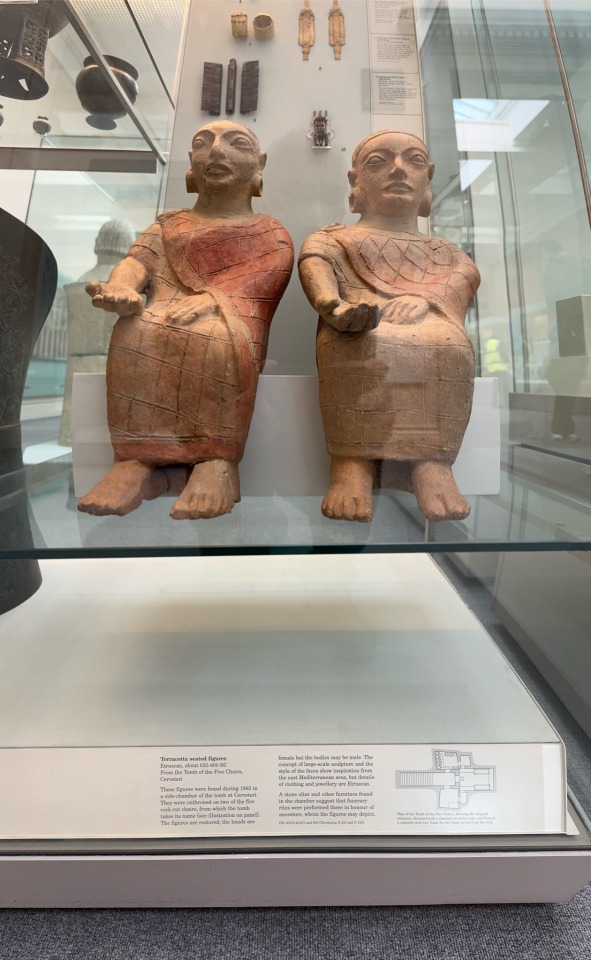
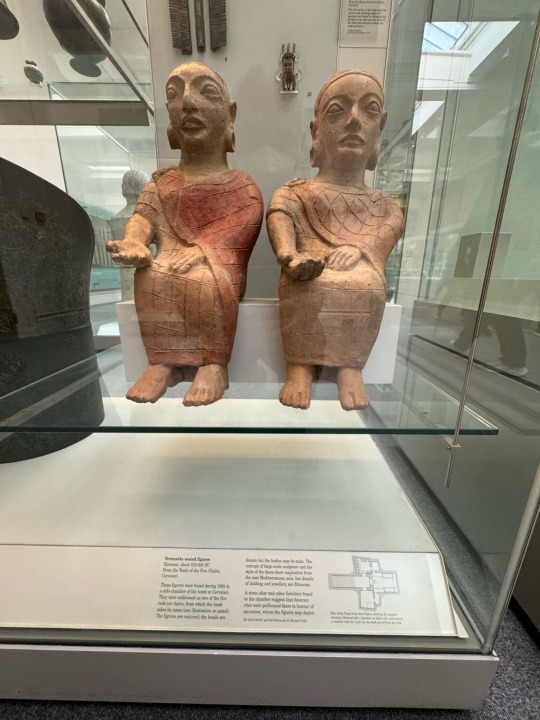
4 notes
·
View notes
Text
•Arthur's Appearance: an interpretation by historian Sean Cunningham•



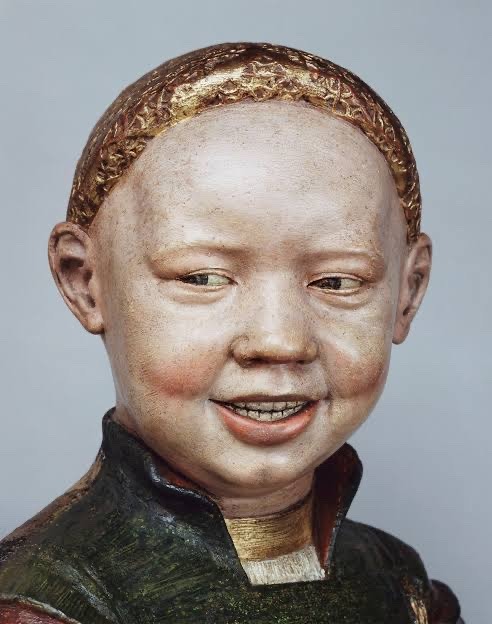
“The known portraits of Prince Arthur show a tall boy, possibly in his early teenage years. He has auburn hair and pale skin and a long, far, angular face. He has a slim and wiry build and is dressed very richly with intricate pieces of jewellery in his hat and around his neck.
His father Henry VII was also known for these physical characteristics, and the prince also shares the hoods and bagsed eyes of his grandmother Margaret Beaufort.
A quick correlation of these features makes it tempting but (dangerous) to suggest that Arthur therefore was blessed with the same kind of personality ascribed to his father and to his Beaufort relatives - serious, focussed, dogged, suspicious and calculating.
Arthur's brother Henry, on the other hand, in near-contemporary pictures, has the round, slightly chubby appearance of his mother, Elizabeth of York, and her father Edward IV. A painted terracotta bust by Guido Mazzoni from the Royal Collection is thought by some experts to represent a laughing Prince Henry aged about seven, from the period 1498-9.
The unproven association of this work with Henry has made enough of a connection for later writers to link imagery and personality. It is all too easy to use identifiable images of people from the past to begin to reconstruct what their personalities might have been like.
The works above, when addressed together, instantly separate the character of the two princes and tend to confirm our beliefs about written descriptions of their personalities.
Prince Henry was full of life, carefree and impulsive; Arthur was cold, detached and careworn. Written comments and notes often help to qualify such descriptions but they might also only compound what we have taken from visual evidence.
The ambassador to Milan in September 1497 described Arthur as taller than his age might suggest, with striking grace and beauty. The prince's conversations in Latin were also noticeably impressive. That brief summary suggests that Arthur's education was working very effectively.”
Cunningham, S. Arthur Tudor: The Tudor King Who Never Was.
#arthur tudor#prince Arthur#tudor dynasty#house of Tudor#henry vii#elizabeth of york#henry viii#Edward Iv#margaret Beaufort#house of Beaufort#plantagenet dynasty
25 notes
·
View notes
Text
Seasonal Colour Palettes: Fashion Tips for Dressing with the Latest Colour Trends
Regarding fashion, colour is one of the most important factors to consider. The right colours can enhance your natural features, complement your skin tone, and make you stand out in a crowd. That's why staying up-to-date with the latest seasonal colour palettes is key to dressing fashionably.
Every season, from pastel hues in the spring to warm earth tones in the fall, brings unique colours that can be incorporated into your wardrobe. In this blog, we'll explore some of the latest seasonal colour palettes and provide tips on including them in your daily outfits. Whether you want to refresh your wardrobe or stay on top of the newest trends, this guide covers you.
Spring Colours
Spring is a season of renewal, growth and rejuvenation, and what better way to reflect that than through your fashion choices? With the latest colour trends, you can easily add fresh and vibrant hues to your wardrobe and make a statement. Here are some fashion tips for dressing with the latest spring colour palette.
Pastels
Pastel colours are a timeless spring trend, perfect for creating a soft and romantic look. Light shades of pink, blue, green and yellow can add a feminine touch to any outfit. Try pairing a pastel blouse with a skirt or trousers in a complementary neutral colour like white or beige for a chic and effortless look.
Bold Hues
Spring is also the perfect time to experiment with bold and bright colours. Shades like fuchsia, electric blue, and bright orange are popular this season and can instantly add fun and excitement to your outfit. If you're hesitant about wearing a bright outfit, try incorporating a pop of colour with your accessories, such as a statement necklace or bag.
Earthy Tones
Earthy tones like olive green, terracotta, and rust make a comeback this season. These shades are versatile and can be easily dressed up or down. Pair a terracotta blouse with denim jeans for a casual weekend look, or wear an olive green dress with some statement jewellery for a night out.
Summer Colours
Summer is the season of bright and vibrant colours that can transform your wardrobe and make a statement. From soft pastels to bold neons, the seasonal color palette of summer is diverse and exciting. Dressing with the latest colours is a fun way to refresh your style and stay up-to-date with fashion.
Melange colors
Melange colors are a great choice for summer because they are light and airy and help keep you cool. Some popular melange colors for summer include raspberry pink, anthra, and blue. These versatile colors can be dressed up or down, making them perfect for any occasion. These colors add glamour to your dress.
Soft Pastels
Soft pastels are a classic summer colour trend that never goes out of style. These colours create a light and airy look ideal for the warmer months. Pastel shades like baby blue, mint green, and blush pink are popular for summer dresses and accessories. Pairing pastels with neutral colours like white or beige can help to create a cohesive and sophisticated look.
Bold Neons
For those who love to make a statement with their style, bold neons are a great choice. These colours are perfect for adding a pop of colour to any outfit and are particularly popular for swimsuits and activewear. Shades like neon green, hot pink, and electric blue will turn heads and create a fun and playful look.
Metallic Accents
Metallic accents are a popular summer colour trend that can add a touch of glamour and sophistication to any outfit. Metallic shades like gold, silver, and bronze are perfect for accessories like jewellery and handbags and clothing items like skirts or blouses. Pairing metallic accents with neutral colours like black or white can help to create a chic look.
Fall colours
Fall is a time of year when nature's rich and warm colours are on full display. The changing leaves and golden sunsets inspire fashion designers to incorporate these colours into their latest collections. As the temperature drops, updating your wardrobe with the latest colour trends is important to stay stylish and comfortable.
Neutral Shades
Neutrals are the base for any outfit and are perfect for creating a soothing look. Beige, camel, and grey are timeless classics that never go out of style. These hues can be paired with bolder colours to create a balanced and cohesive look.
Warm Tones
Warm tones evoke a feeling of comfort and cosiness. Think of shades of orange, red, and brown. These colours create a warm and inviting look, especially during the colder months. Pairing warm tones with neutral colours can create a harmonious look, while pairing them with cooler tones can create a striking contrast.
Jewel Tones
Jewel tones are wealthy, adding a touch of luxury to any outfit. Colours such as emerald green, sapphire blue, and ruby red are perfect for creating a regal and sophisticated look. Pairing jewel tones with neutral colours can create a balanced and elegant look, while pairing them with other bold colours can create a bold and dramatic look.
Winter colours
Winter is a season that is characterized by chilly temperatures, and as such, it is imperative to dress appropriately. One of the most important aspects of dressing for winter is incorporating the right colour palette into your wardrobe. Winter's seasonal colour palettes typically consist of muted and darker tones that reflect the season's ambience.
Solid colors
Solid colors can be more versatile than patterns. They can be paired with a variety of other colors and patterns. Additionally, solid colors can be more flattering on various body types. They can help to create the illusion of a slimmer figure, and they can also help to elongate the body. At Ciyapa, you can get a huge collection of solid-coloured t-shirts, including hot cocoa, royal blue, versatile black, everyday white, and many more.
Deep Shades
Deep shades like burgundy, forest green, and navy blue can add depth and richness to your outfit. These shades can create a cosy and warm feeling that is perfect for winter. They can be worn as standalone pieces or mixed with other colours to create a contrast.
Icy Tones
Icy tones like baby blue, pale pink, and lilac are perfect for those who prefer a softer and cooler look. These shades can add a touch of elegance and femininity to your outfit. You can pair them with whites, greys, and other pastel colours to create a harmonious look.
Midnight Hues
sophisticated and elegant look. Mix and match them with metallics or brighter colours to create Midnight hues like black, dark grey, and deep purple can add a touch of drama and mystery to your outfit. These shades can be perfect for formal occasions or for those who prefer a more a contrast.
Final Thoughts
In a world that's constantly evolving, fashion is no exception. From clothing to accessories, colours play an important role in every fashion trend. While following the latest colour palette creator can be fun, it's important to remember that personal style should always come first.
Whether you prefer bold and vibrant hues or more muted and subtle tones, you can always incorporate the latest colours into your wardrobe without compromising your unique style. Various colour palette generator apps and specialists are sitting there to help you create your unique suitable shade palettes to compliment your skin tone & features.
So go ahead and experiment with the latest seasonal colour palettes, but never forget that the most important colour of all is the one that makes you feel confident and comfortable in your skin. Get amazing solid colored t-shirts at Ciyapa and flaunt these beautiful colours.
Original Source:
#Seasonal colour palettes#Fashion tips#Latest colour trends#Dress to impress#Bold hues#Understated shades#Fashion trends#Wardrobe essentials#Fashionable outfits#Style inspiration#Trendy colours#Fashion-forward#Fashionista#Clothing trends#Style guide.
4 notes
·
View notes